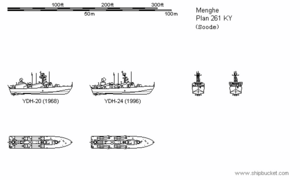Plan 261 missile boat
 Plan 261 in the most common as-built layout, and after refits in the 1990s.
| |
| Class overview | |
|---|---|
| Builders: | see below |
| Operators: | |
| Preceded by: | none |
| Succeeded by: | |
| Built: | 1964-1988 |
| In commission: | 1965-2020 |
| Completed: | 121 |
| Preserved: | 2 |
| General characteristics (before refits) | |
| Type: | missile boat |
| Displacement: |
|
| Length: | 38.6 m overall |
| Beam: | 7.6 m |
| Draught: | 1.73 m |
| Propulsion: | 3 × M-503G diesel (4,000 hp each) |
| Speed: | 39 knots |
| Range: |
|
| Complement: |
|
| Sensors and processing systems: |
|
| Electronic warfare & decoys: |
|
| Armament: | |
The Plan 261 class were a group of Osa-class missile boats operated by Menghe during the 1960s through the 2000s. The first 8 hulls were built in Letnia and exported to Menghe, but subsequent hulls were built in Menghe, first from knockdown assembly kits and later from entirely indigenous production. Menghean sources claim that a total of 113 Plan 261 boats were built domestically over the course of 21 years. Several dozen remain in service with the Menghean Navy, though they have been refitted with YDH-24 and YDH-26 anti-ship missiles and improved electronics.
History
After the end of the Menghean War of Liberation, the Democratic People's Republic of Menghe sought to rapidly build up a new coastal navy in order to deter attacks by major Casaterran and Helian powers. Faced with a limited budget and small domestic electronics sector, the DPRM's leaders placed a heavy focus on inexpensive fast attack craft, whose short range and weak defenses were acceptable sacrifices given Menghe's strategic situation.
Letnia delivered the first of eight Project 205 (Osa-class) missile boats in 1965, along with technical information for building more. The Anchŏn Naval Yard quickly set up its own production facility, and commissioned its first domestic-build version in 1968. The Menghean People's Navy officially designated the Osa-class missile boat as Plan 261, even though it was originally a foreign design.
Design
The Plan 261 missile boat was derived from the baseline Project 205 design, known in the West as the Osa-I. This configuration had slab-sided missile boxes, as opposed to the cylindrical ribbed ones on Project 205U. It was powered by three 4000hp M-503G diesel engines, each connected to a single fixed-pitch propeller shaft. Defensive armament consisted of two AK-230 turrets, though the fire-control system supporting them was incapable of engaging anti-ship missiles reliably and was mainly intended for use against aircraft and helicopters.
Variants and upgrades
While the first Plan 261 hulls were entirely identical to the Project 205, to the point of being built from Letnian knockdown kits. As the years passed, however, Menghean engineers made a number of changes to the design.
The 17 units built at the Kimhae Naval Yard, and the 9 units built at Baekjin, had a modified mast structure which could fold backward over the hull. The radio antennas could fold down as well, and the aft fire control antenna was omitted in favor of entirely manual fire control. Ships of this type could pass under overhead obstacles with a clearance of just 7 meters above the high-tide mark, and they were intended to operate out of protective tunnels on the east coast.
One unit was completed in 1986 with two launch boxes for the high-supersonic YDH-23 anti-ship missile, also used on the Chŏndong-class destroyers. This layout was found to create stability issues, especially after firing one missile, and due to its short-range radar systems and rudimentary datalinks the small Plan 261 was unable to properly exploit the YDH-23's long range.
In 1996, the Menghean Navy began refitting Plan 261 boats to carry the YDH-24 anti-ship missile. With a mass of 900 kilograms, compared to 2,600 kilograms for the YDH-20, the new missile is lighter, allowing the replacement of single YDH-20 boxes with twin YDH-24 boxes. Quadruple YDH-24 boxes, also fitted to the Plan 215 corvettes in refits, were considered, but resulted in an excessive increase in weight. The refitted boats not only carry more missiles (8 compared to 4), but can also launch those missiles to a longer range with greater accuracy, provided that they receive targeting data from another platform over the upgraded datalink. The mid-90s refit also improved the fire-control system for the AK-230 guns, allowing anti-missile capability, though the vessel's poor stability still degrades accuracy.
Production totals
Menghe had 121 Plan 261 missile boats in service in 1988. Actual construction was most likely higher, as this figure excludes ships which were built but lost in accidents prior to 1988, and it excludes hulls built for export to Polvokia and Innominada. The extant ships in 1988 were divided between Menghean and foreign shipyards as follows:
- Letnia: 8 hulls (1965-1968)
- Anchŏn: 57 hulls (1968-1988)
- Dongchŏn: 14 hulls (1971-1976)
- Chŏnjin: 16 hulls (1971-1987)
- Baekjin: 9 hulls (1983-1987)
- Kimhae: 17 hulls (1980-1987)